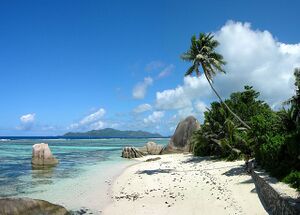
 Blue whales: Ocean giants return to 'safe' tropical haven, BBC News (Nov 23, 2023)
Blue whales: Ocean giants return to 'safe' tropical haven, BBC News (Nov 23, 2023)
Biodiversity[edit | edit source]
Seychelles is among the world's leading countries to protect lands for threatened species, allocating 42% of its territory for conservation. Like many fragile island ecosystems, Seychelles saw the loss of biodiversity when humans first settled in the area, including the disappearance of most of the giant tortoises from the granitic islands, the felling of coastal and mid-level forests, and the extinction of species such as the chestnut flanked white eye, the Seychelles parakeet, and the saltwater crocodile. However, extinctions were far fewer than on islands such as Mauritius or Hawaii, partly due to a shorter period of human occupation. Seychelles today is known for success stories in protecting its flora and fauna. The rare Seychelles black parrot, the national bird of the country, is now protected.
Environmental legislation is very strict, and every tourism project must undergo an environmental review and a lengthy process of consultations with the public and conservationists. Seychelles is a world leader in sustainable tourism. [according to whom?] The end result of this sustainable development is an intact and stable natural environment, which attracts financially strong visitors (150,000 in 2007) rather than short-term mass tourism. Since 1993 a law guarantees the citizens the right to a clean environment and at the same time obliges them to protect this environment.
Trees, woodland and forest[edit | edit source]
The country had a 2019 Forest Landscape Integrity Index mean score of 10/10, ranking it first globally out of 172 countries. W
Environmental achievements[edit | edit source]
Since the use of spearguns and dynamite for fishing was banned through efforts of local conservationists in the 1960s, the wildlife is unafraid of snorkelers and divers. Coral bleaching in 1998 has damaged most reefs, but some reefs show healthy recovery (such as Silhouette Island).
Despite huge disparities across nations, Seychelles claims to have achieved nearly all of its Millennium Development Goals. 17 MDGS and 169 targets have been achieved. Environmental protection is becoming a cultural value.
News and comment[edit | edit source]
2022
 How we discovered that sea turtles in Seychelles have recovered from the brink, The Conversation (Mar 17, 2022)
How we discovered that sea turtles in Seychelles have recovered from the brink, The Conversation (Mar 17, 2022)
2009
"All countries must work together to combat climate change. In the Seychelles, our 116 islands are on the front line. We can lose our beaches, our tourism, our land and our way of life, if something is not done quickly." Marie-Antoinette Alexis, the mayor of Seychelles capital Victoria,[1] February 27
About Seychelles[edit | edit source]
Seychelles ( , ; French: [sɛʃɛl] or [seʃɛl]), officially the Republic of Seychelles (French: République des Seychelles; Seychellois Creole: Repiblik Sesel), is an island country and archipelagic state consisting of 115 islands (as per the Constitution) in the Indian Ocean. Its capital and largest city, Victoria, is 1,500 kilometres (800 nautical miles) east of mainland Africa. Nearby island countries and territories include the Comoros, Madagascar, Mauritius, and the French overseas departments of Mayotte and Réunion to the south; and Maldives and the Chagos Archipelago (administered by the United Kingdom as the British Indian Ocean Territory) to the east. Seychelles is the smallest country in Africa as well as the least populated sovereign African country, with an estimated population of 100,600 in 2022.
Seychelles was uninhabited prior to being encountered by Europeans in the 16th century. It faced competing French and British interests until it came under full British control in the late 18th century. Since proclaiming independence from the United Kingdom in 1976, it has developed from a largely agricultural society to a market-based diversified economy, characterized by service, public sector, and tourism activities. From 1976 to 2015, nominal GDP grew nearly 700%, and purchasing power parity nearly 1600%. Since the late 2010s, the government has taken steps to encourage foreign investment.
External links[edit | edit source]
Wikipedia: Seychelles, Wildlife of Seychelles, Vallée de Mai